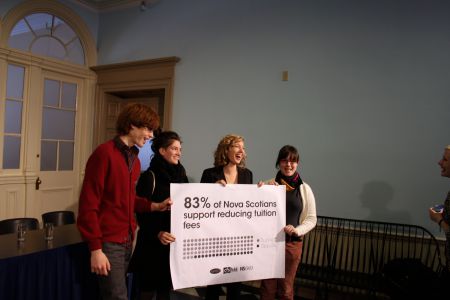The Nova Scotia Post-Secondary Education Coalition took the fight against deregulating tuition fees into provincial government's living room last week to announce that, according to their findings, they have the support of a vast majority of the province.
“When it comes to post-secondary education, [the province has] been consulting the wrong people.” Says Chris Ferns, president of the Association of Nova Scotia University Teachers.
The press conference, held on the first floor of Province House, was called to announce the results of a public opinion poll that shows 83% of Nova Scotians want tuition fees reduced. At the table beside Ferns was Nova Scotia representative for the Canadian Federation of Students Gabe Hoogers and Joan Jessome, president of the Nova Scotia Government Employees Union.
The concerted push by the coalition was spurred by the O'Neill report, which was commissioned by the premier's office to find savings within the post-secondary sector. Unfortunately, says the coalition, if the measures in the report were adopted, it would put the province's debt load squarely on the backs of Nova Scotian students. Namely, the report calls for the province to stop regulating tuition fees and let the universities charge what they want. While it does advocate for some level of increase to the student loans and grants system, the CFS argues that the system will never be expanded enough to deal with the population who will no longer be able to afford university. The coalition also noted talk that the province may cut the bursary system, which Hoogers says could drive up tuition fees by as much as 20%.
Beyond just the issue of tuition, the recommendations in the report could also change the very foundation of how universities operate.
The plan is essentially a “big box store approach.” Says Ferns. In the report, O'Neill suggests the possible consolidation, or even outright take-over, of several universities, such as NSCAD, by bigger institutions such as Dalhousie. O'Neill also suggests in his report that Mount St. Vincent university, where Ferns is faculty, will have trouble recruiting new students “because its traditional raison d'être of educating and empowering women no longer provides it with a comparative advantage in attracting students.” This assumption was blasted by the members of the coalition, as well as the administration at the university.
The coalition's polling results was the rebuttal to the O'Neill report. While O'Neill, economist and former vice-president of the Bank of Montreal, argues that increasing tuition fees won't negatively impact enrollment, the coalition's report indicates that Nova Scotia's high tuition fees area already acting as a barrier to entry. Nearly a third of those respondents to the survey indicated that someone in their household did not attend university or college in the past year because they did not want, or could not afford, to take on the debt. This also doesn't account for those students from other provinces or countries who didn't come to Nova Scotia because of the debt they would have to take on, especially considering that non-Nova Scotian students must pay out-of-province fees.
In a spooky vision of what Halifax could look like without its massive student population, Hoogers evoked images of empty campuses, a lack of grad students in the job market and “severe economic problems” for Nova Scotia if it doesn't retain its student population.
The polling results reflect Hooger's bleak worst-case scenario. 83% of the province are concerned that students will have to leave the province to seek out better wages due to high student debt. That is, of course, without O'Neill's recommendations.
The report also shows a surprising level of awareness and concern over the state of post-secondary education in Nova Scotia. In fact, it is almost on par with Nova Scotian's prime concern; the perpetual ire of medicare. 65.3% of the province is very concerned with the affordability of post-secondary education, a mere 0.7% below concerns over the quality of healthcare, and above concerns over the level of taxation, unemployment, the quality of public education and the level of crime.
One of the most indicative results of the survey showed that 59% of those polled would pay higher income taxes if they knew that their money would be invested in making post-secondary education more affordable. That number jumps to 70% in the category of those who make below $30,000 a year.
Armed with the statistics to back up their position, the Coalition is gearing up for the February 2nd day of action on tuition fees.
The CFS has been highly visible on campus in recent weeks, having covered much of Dalhousie with Helvetica-laden posters featuring pictures of Darrell Dexter. Rebecca Rose, Maritime Organizer for the CFS, has ample experience organizing student protest from her time as an activist in Ontario. She's pushing for “as many bodies in the street as possible,” she says, but admits with a touch of irony that it might be tough to get some students out, as “they work jobs to pay their fees.”
The report, entitled Public Opinion on Post-Secondary Education in Canada is accurate within +/- 3%, 19 times out of 20. It used a sample size of 810 Nova Scotians.



